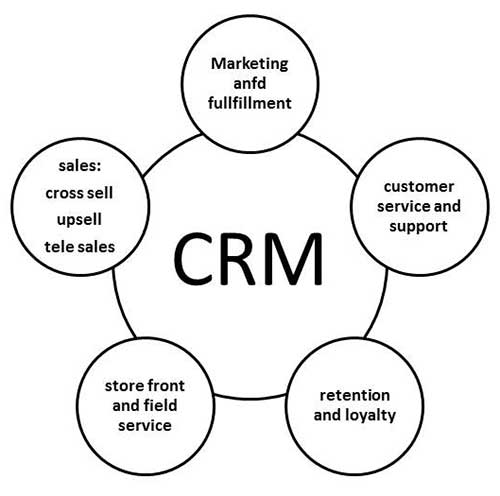
- MIS - Basic Information Concepts
- MIS - Classification of Information
- MIS - Quality of Information
- MIS - Information Need & Objective
- Major Enterprise Applications
- MIS - Major Enterprise Applications
- MIS - Introduction
- MIS - Enterprise Resource Planning
- MIS - Customer Relationship Mgmt
- MIS - Decision Support System
- Knowledge Management System
- MIS - Content Management System
- MIS - Executive Support System
- MIS - Business Intelligence System
- Enterprise Application Integration
- MIS - Business Continuity Planning
- MIS - Supply Chain Management
- MIS Advanced Concepts
- MIS - Business Objectives of MIS
- MIS - System Development Life Cycle
- MIS - Development Process
- MIS - Managerial Decision Making
- MIS - Security and Ethical Issues
- MIS - Summary
- MIS Useful Resources
- MIS - Quick Guide
- MIS - Useful Resources
- MIS - Discussion
MIS - Customer Relationship Management
CRM is an enterprise application module that manages a company's interactions with current and future customers by organizing and coordinating, sales and marketing, and providing better customer services along with technical support.
Atul Parvatiyar and Jagdish N. Sheth provide an excellent definition for customer relationship management in their work titled - 'Customer Relationship Management: Emerging Practice, Process, and Discipline' −
Customer Relationship Management is a comprehensive strategy and process of acquiring, retaining, and partnering with selective customers to create superior value for the company and the customer. It involves the integration of marketing, sales, customer service, and the supply-chain functions of the organization to achieve greater efficiencies and effectiveness in delivering customer value.
Why CRM?
To keep track of all present and future customers.
To identify and target the best customers.
To let the customers know about the existing as well as the new products and services.
To provide real-time and personalized services based on the needs and habits of the existing customers.
To provide superior service and consistent customer experience.
To implement a feedback system.
Scope of CRM

Advantages of CRM
Provides better customer service and increases customer revenues.
Discovers new customers.
Cross-sells and up-sells products more effectively.
Helps sales staff to close deals faster.
Makes call centers more efficient.
Simplifies marketing and sales processes.
Disadvantages of CRM
Some times record loss is a major problem.
Overhead costs.
Giving training to employees is an issue in small organizations.